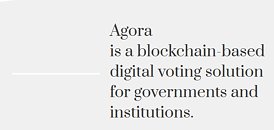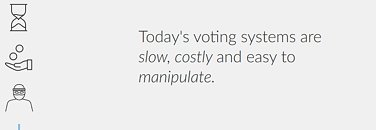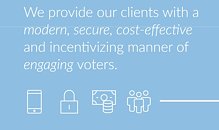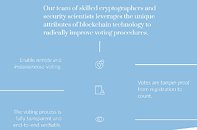Friday, March 16th 2018
Some Blockchain in My Voting, Please: Sierra Leone Implements Innovative System
Putting aside discussion of cryptocurrencies, bubbles, and the debated absence of intrinsic value, blockchain itself has a myriad of uses that are still in their exploration infancy. One such usage - one that was arguably first thought of by Philip K. Dick, albeit unknowingly - was the usage of such a system in voting, as a way to provide transparency and trust towards the system which (supposedly) materializes the will of the people.
When asked which country would be the first to implement a Blockchain-based election (which ran at 70% of the voting stations), Sierra Leone would likely be completely absent as an option. The country, which has a population of 7.4 million, has a known history of political and societal unrest, having seen multiple UN interventions in its (relatively) recent history. The company had no technological capacity to build such a blockchain-based voting system - and thus turned to an outside provider. Agora was the chosen company, which aimed to power Sierra Leone's presidential election through anonymously stored votes in an immutable ledger, thereby offering instant access to the election results. The wins come not only in counting speed and actual logistics and state spending improvements, though: the usage of blockchain obviously also ushers in transparency."Anonymized votes/ballots are being recorded on Agora's blockchain, which will be publicly available for any interested party to review, count and validate," said Leonardo Gammar, CEO of Agora. "This is the first time a government election is using blockchain technology." He added that "Sierra Leone wishes to create an environment of trust with the voters in a contentious election, especially looking at how the election will be publicly viewed post-election. By using blockchain as a means to immutably record ballots and results, the country hopes to create legitimacy around the election and reduce fall-out from opposition parties."I must say I absolutely believe in blockchain technology's importance to bring the democratic system towards a modern, tamper-proof era that fully eliminates human error (and human dishonesty). As it has become clear that electronic voting systems based on typical electronic technology are hardly tamper proof and are susceptible to hacks by interested third parties, the usage of a decentralized, public network that uses the blockchain's Merkle tree systems sounds as the perfect solution. "If you believe that most countries will use some form of digital voting 50 years from now, then blockchain is the only technology that has been created which can provide an end-to-end verifiable and fully-transparent voting solution for this future," said Leonardo Gammar. Here's to that.
If you were curious regarding that Philip K. Dick reference, I've leafed through my short story collection to provide you this quote, from The Variable Man, and added a link to the Project Gutenberg copy:
"This gimmick makes it possible for citizens to raise and decide issues directly. They won't have to wait for the Council to verbalize a measure. Any citizen can transmit his will with one of these, make his needs register on a central control that automatically responds. When a large enough segment of the population wants a certain thing done, these little gadgets set up an active field that touches all the others. An issue won't have to go through a formal Council. The citizens can express their will long before any bunch of gray-haired old men could get around to it." Remove centralized and add a public ledger, and you've got the (currently) best possible use of a blockhain.
Sources:
Agora, The Gutenber Project's Philip K. Dick "The Variable Man", via TechCrunch
When asked which country would be the first to implement a Blockchain-based election (which ran at 70% of the voting stations), Sierra Leone would likely be completely absent as an option. The country, which has a population of 7.4 million, has a known history of political and societal unrest, having seen multiple UN interventions in its (relatively) recent history. The company had no technological capacity to build such a blockchain-based voting system - and thus turned to an outside provider. Agora was the chosen company, which aimed to power Sierra Leone's presidential election through anonymously stored votes in an immutable ledger, thereby offering instant access to the election results. The wins come not only in counting speed and actual logistics and state spending improvements, though: the usage of blockchain obviously also ushers in transparency."Anonymized votes/ballots are being recorded on Agora's blockchain, which will be publicly available for any interested party to review, count and validate," said Leonardo Gammar, CEO of Agora. "This is the first time a government election is using blockchain technology." He added that "Sierra Leone wishes to create an environment of trust with the voters in a contentious election, especially looking at how the election will be publicly viewed post-election. By using blockchain as a means to immutably record ballots and results, the country hopes to create legitimacy around the election and reduce fall-out from opposition parties."I must say I absolutely believe in blockchain technology's importance to bring the democratic system towards a modern, tamper-proof era that fully eliminates human error (and human dishonesty). As it has become clear that electronic voting systems based on typical electronic technology are hardly tamper proof and are susceptible to hacks by interested third parties, the usage of a decentralized, public network that uses the blockchain's Merkle tree systems sounds as the perfect solution. "If you believe that most countries will use some form of digital voting 50 years from now, then blockchain is the only technology that has been created which can provide an end-to-end verifiable and fully-transparent voting solution for this future," said Leonardo Gammar. Here's to that.
If you were curious regarding that Philip K. Dick reference, I've leafed through my short story collection to provide you this quote, from The Variable Man, and added a link to the Project Gutenberg copy:
"This gimmick makes it possible for citizens to raise and decide issues directly. They won't have to wait for the Council to verbalize a measure. Any citizen can transmit his will with one of these, make his needs register on a central control that automatically responds. When a large enough segment of the population wants a certain thing done, these little gadgets set up an active field that touches all the others. An issue won't have to go through a formal Council. The citizens can express their will long before any bunch of gray-haired old men could get around to it." Remove centralized and add a public ledger, and you've got the (currently) best possible use of a blockhain.







19 Comments on Some Blockchain in My Voting, Please: Sierra Leone Implements Innovative System
Fully outsourcing the gig might solve this specific issue, but that opens up the doors to foreign interference paranoia (sup, 'muricans!). Can't really trust those imperialists not to make sure their puppets are still on throne (again, sup 'muricans!).
"In the weeks that followed, American forces were in the forefront of NATO operations against Libya. More than 8,000 American personnel in warships and aircraft were deployed in the area. At least 3,000 targets were struck in 14,202 strike sorties, 716 of them in Tripoli and 492 in Brega. "
I apologize for the historical inaccuracy. Happens when one writes solely from his memory. I've updated the story accordingly.
Thanks for bringing that up =)
I'm not sure how they're enforcing one vote per person either. Blockchain can only enforce accounts.
It makes sense for a relatively poor country like Sierra Leone because the cost of implementing a dedicated system is likely too much for them to bare.
This isn't some gpufarm, either.
Election fraud by adding false votes is a thing, and "worth it" isn't a logic you'd argue with people who won't relinquish power even when everything's falling apart around them.
The concept of elections itselfhas been abused before.
Simple solution: Get rid of all humans and there will be no fraud.
1) biometrics of the facial structure, iris, and finger print. If someone is trying to commit voter fraud, this information can ID them long after the election.
2) chipped voter ID card that pulls your record from the database and enforces the one-vote-per-card-per-election policy. The vote can't be changed without the presence of the card.
3) something that's not public knowledge that's quick to answer (likely in multiple choice format with three phonies).
Every voting machine should have it's own private/public key encryption system for conveying results (these are pre-registered with the servers). If someone manages to hack a single machine, every other machine should be as monumental of a task as the first and an audit at the servers will expose the compromised machine.
Source code of the entire system should be open source for public audit.
The individual voting machines don't store anything unless there's problems with communicating to the voting servers. All of the data ends up on the servers so if fraud occurs, tampering with the machines won't get them anywhere.
TL;DR: treat the voting process like it's a level 4 biohazard lab.
I don't think blockchain adds anything of value to this process.